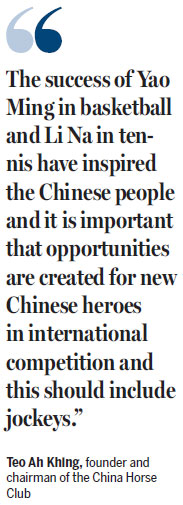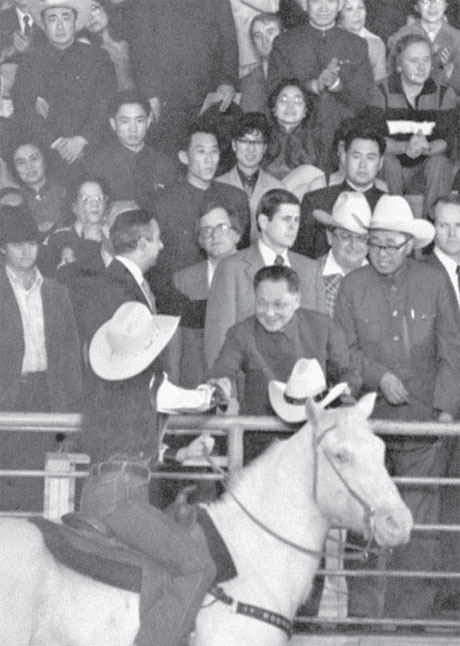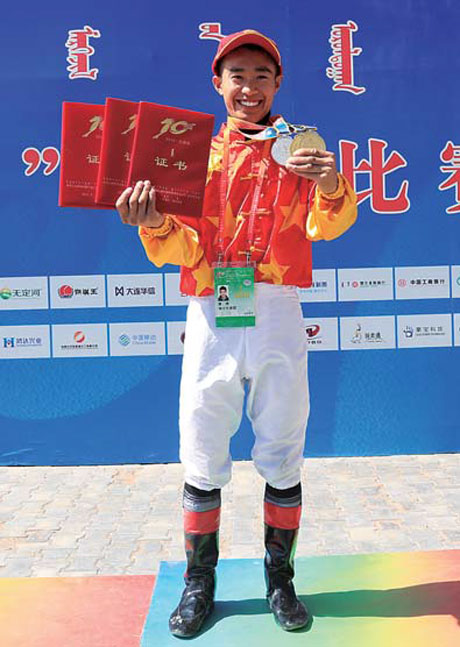China's thoroughbred industry gallops ahead
|
A performer presented a cowboy hat to late Chinese leader Deng Xiaoping during his visit to the United States in 1979. Xinhua |
|
Qin Yong, a jockey from Hubei province, won two gold medals at the 10th National Traditional Games of Ethnic Minorities in Ordos, the Inner Mongolia autonomous region, in August. Provided to China Daily |
Breeders and racers gain traction in global pastures; Chinese equine clubs send more racehorses overseas
China's burgeoning thoroughbred industry left an indelible impression on Chinese and international leaders of the sport with the fourth annual China Equine Cultural Festival last weekend, this year held in Wuhan, the capital of Hubei province.
In its short existence, the CECF has shown itself to be a platform for the successful promotion and launch of Chinese owners and Chinese thoroughbreds onto an international stage, and in 2015 this goal of international promotion was expanded further.
At a gala event after the race day, a memorandum of understanding was announced between the Barbados Turf Club and the China Horse Club to have Chinese jockeys competing in Barbados as a steppingstone to competitions in other parts of the world. The first two jockeys selected for this program, which is part of the CHC China Dream Project, are Qin Yong and Chen Li. Both were in competition at the CECF Wuhan last weekend, and both are expected to compete in Barbados before the end of the year.
The announcement was made in front of the Vice-Mayor of Wuhan Liu Yingzi, Wuhan Sports Bureau Director Wang Shenshun, the President of the International Federation of Horseracing Authorities Louis Romanet, Chairman of the Wuhan CEA and Principal of Wuhan Business School Li Zuoqing, China Daily Deputy Editor-in-Chief Kang Bing, leading international horse owner Sheikh Fahad Al Thani of Qatar and notable participants in the sport. The CHC China Dream Project has already promoted Chinese racehorses and Chinese racehorse owners internationally.
In August, Qin Yong, who is from Enshi, Hubei, won two gold medals at the 10th National Traditional Games of Ethnical Minorities of China in Ordos, the Inner Mongolia autonomous region, on CHC trained racehorses. These two wins were the first time Hubei has beaten traditional horse-racing teams from Xinjiang and Inner Mongolia.
"The success of Yao Ming in basketball and Li Na in tennis have inspired the Chinese people and it is important that opportunities are created for new Chinese heroes in international competition, and this should include jockeys," said Teo Ah Khing, the founder and chairman of the China Horse Club.

"Our members want to enjoy the sport of horse racing but they also want to make a contribution to growing the sport and to creating opportunities for talented young Chinese," he said. "This is a program that can do that."
The CECF is the initiative of Teo, a Chinese-Malaysian Harvard-trained architect who designed Dubai's palatial Meydan grandstand and racecourse. As chairman of the CHC, he is supported by the CHC International Advisory Council that includes luminaries such as Professor Dr. Joseph Deiss, the 65th president of the United Nations General Assembly and former president of the Swiss Confederation, and John Magnier, the principal of the world's premier thoroughbred-breeding operation, Coolmore.
The first CECF race meeting was held in 2013 in Hohhot, capital of the Inner Mongolia autonomous region. Subsequent events have been held in the Yangtze Delta Region, in Shanghai, Zhejiang and Kunshan, and in Singapore.
The Chinese mainland's first foray into thoroughbred racing can be dated back to 1848 in Shanghai, and the sport was at its peak in the early 20th century. In recent years the sport has started to revitalize, and its virtues of social interaction, entertainment and networking - and its benefits as a creator of jobs and new industry - are promoted through events such as the CECF.
China's top leaders have long had close connections with horses. People still remember the famous saying by Deng Xiaoping referring to "One country, Two systems", promising Hong Kong would "continue to race horses" after it returns to China.
It also has modern resonance. When Turkmenistan's President Gurbanguly Berdimuhamedow visited China last year, he brought an Akhal Teke horse, the country's symbolic treasure, to President Xi Jinping as a present. The two presidents also attended the International Akhal Teke Horse Association Special Conference in Beijing.
During President Xi's visit to Mongolia in 2014, Mongolia's President Tsakhiagiin Elbegdorj offered two Mongolian horses as national gifts during the Nadaam Festival. President Xi also watched a gaucho horse show when he visited Argentina, and when he traveled to New Zealand last November, he visited the country's thoroughbred auction, which was a great encouragement for the entire Chinese horse industry.
President Xi is on his historical visit to the United States and the biggest chance for cooperation between the two countries may be just around the corner. This cooperation may lead to benefits for many Chinese industries including the horse-racing industry.
zhuanti@chinadaily.com.cn
(China Daily 09/23/2015 page27)
















